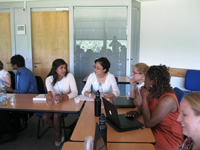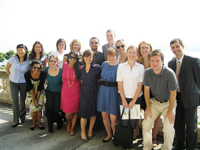22 May 2012, Geneva, Switzerland - Offered in Geneva by Duke University’s Terry Sanford Institute of Public Policy and hosted at the United Nations Institute for Training and Research (UNITAR), the Programme on Global Policy and Governance is designed to expose future international policy leaders to the field of global governance and policy from an academic and experiential perspective. In addition to the ten week Geneva Policy Internships, a major element of the Programme is the course International Humanitarian Assistance: Policy, Law and Practice, which traditionally includes a module on UNOSAT humanitarian rapid mapping service. This year the course will run from June 25 to 29.
The course is intended to provide students with a dynamic and thorough introduction to international humanitarian assistance covering legal aspects and major practical and policy considerations with regard to implementation. The course is practitioner oriented with a strong foundation in both academic theory and current events. The structure includes institutional briefings and class lectures from experienced high-level practitioners.
By outlining the framework of international human rights law and other branches of international law relevant to humanitarian assistance including international humanitarian law and refugee law, the course discusses the humanitarian principles of humanity, neutrality, impartiality and independence. Given their current international relevance, it also presents a brief history and the main elements behind the notion of “human security,” humanitarian reform, as well as, the importance of coherence within the UN system.
Key considerations regarding the implementation of humanitarian assistance, including early warning systems, and operational challenges such as timely response and unhindered access; funding; coordination and cooperation; political considerations;  the relationship between humanitarian assistance and longer-term sustainable development are discussed. Students are introduced to the many actors that play a part in providing humanitarian assistance ranging from the United Nations to the International Committee of the Red Cross (ICRC) to non-governmental actors.
the relationship between humanitarian assistance and longer-term sustainable development are discussed. Students are introduced to the many actors that play a part in providing humanitarian assistance ranging from the United Nations to the International Committee of the Red Cross (ICRC) to non-governmental actors.
The course maintains a focus on those affected by humanitarian crises and the specific approaches to respond to their situations. It looks at protection and assistance for refugees and internally displaced persons (IDPs); and the special needs of particularly vulnerable groups including women and children. UNOSAT mapping and satellite analysis work has been a regular feature in the course for several years.
Photos: 2011 course in Geneva courtesy of Duke Unversity

